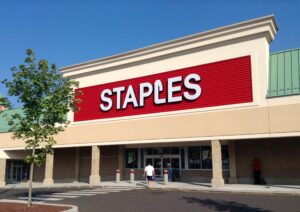By Sharon Oliver
Contributing Writer
BOSTON – Staples sparked the office supply revolution, fittingly, because of Independence Day. One of its founders, Thomas G. Stemberg was unable to buy a printer ribbon because his local office supply store in the Boston area was closed for the July 4 holiday. Frustrated by the reliance on small stores, Stemberg envisioned an office supply superstore with longer hours and an extensive inventory.
First store in Brighton
Though it was not the first office supply retail company to enter on the scene, Staples is the largest. Founded by former business rivals Leo Kahn and Thomas G. Stemberg, along with Myra Hart, Staples’ first store opened in the Brighton section of Boston in 1986. Ten years later, the company reached the Fortune 500 and eventually acquired the Quill Corporation, another office retailer, which got its start in 1956. Staples has made several attempts to acquire its number two competitor, Office Depot, which also owns OfficeMax.

One of the private equity firms where Staples received backing was Bain Capital whose co-founder, Senator Mitt Romney, served on the board of directors for 15 years, helping shape their business model.
At the beginning, gift certificates were sent to 35 local small-business office managers but after five weeks, only nine of them had been redeemed, prompting Stemberg to focus on marketing projects. The company hoped to appeal to small-business owners and parents shopping for school supplies with its “Yeah, We’ve Got That” campaign in the 1990s. The campaign, which included radio and television ads, ran for eight years, and won several advertising awards. A new slogan came after that one retired.
The large red “Easy Button” was originally intended to be a fabricated button with “magical” capabilities but then customers began contacting the company wanting to know how they could purchase one. Staples responded by making them a real product (available in English as “Easy,” in French as “Simple,” in Spanish as “Facil,” and in German as “Einfach easy”). The buttons were shipped to stores in the U.S., Canada, and Germany in 2005 with sales reaching 1.5 million by the end of 2006. A “marketer’s dream,” the buttons served as advertising and increased brand recognition.
Meteoric growth
By the early 2000s, there were around 1,300 Staples stores located in major metropolitan cities and smaller markets in 45 states including the District of Columbia, and 10 Canadian provinces. With a determination to provide customers with one-stop shopping, the store stocked up on everything that could be used in an office, from paper and pens to office furniture and microwave ovens. Staples announced in 2021 that it would again try to buy Office Depot, but its offer was turned down in June 2022. That same year, Staples launched a same-day passport photo service in over 1,000 stores and TSA PreCheck enrollment at select locations. With a strong commitment to sustainability, the company is ranked in the top 25 of the EPA’s Green Power Partner list.
Team of rivals
All three of the founders were former competitors in the supermarket industry.
Medford native Leo Kahn was an entrepreneur and reporter who was born in 1916 and founded the Fresh Fields and Nature’s Heartland chains, which are now part of Whole Foods Market. Following a series of strokes, Kahn died at a Springhouse care facility in 2011.
Thomas George Stemberg was born in Orange, New Jersey in 1949. As vice president in the sales and merchandising division at Star Market, Stemberg also had a background in the supermarket industry. After Stemberg’s employer fired him in 1985 because of “philosophical differences,” he used his year’s worth of severance pay to seek out other business opportunities, which led to co-founding Staples. Stemberg died in 2015 from gastric cancer.
Rounding out the trio of founders is Myra Hart, a Cornell University graduate who was formerly director of marketing for Star Market. She later served as Professor of Entrepreneurship at Harvard Business School until retiring in 2007.
RELATED CONTENT:
New Balance was founded in Boston to develop arch supports and orthopedic footwear
Boston salesman King Camp Gillette changed the way the world shaves












